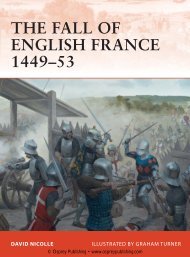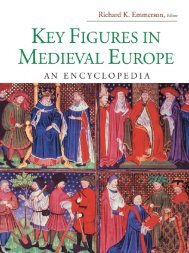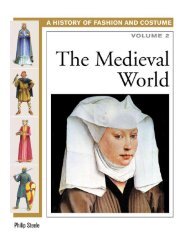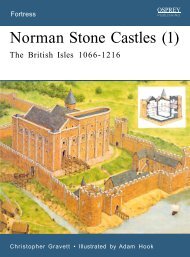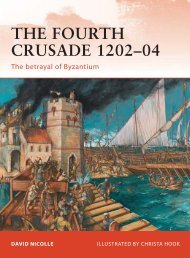Osprey - General Military - Knight - The Warrior and ... - Brego-weard
Osprey - General Military - Knight - The Warrior and ... - Brego-weard
Osprey - General Military - Knight - The Warrior and ... - Brego-weard
Create successful ePaper yourself
Turn your PDF publications into a flip-book with our unique Google optimized e-Paper software.
eturned. In 1139, during the war between Stephen <strong>and</strong> Matilda, it was recorded that<br />
there were so many refugees seeking sanctuary in Worcester Cathedral from an<br />
expected attack by Robert of Gloucester that the monks had no space to perform<br />
divine service. When all of these goods were brought into one place the temptation to<br />
breach sanctuary <strong>and</strong> collect the booty of war could prove too great.<br />
<strong>The</strong> sanctuary of the Church was even more at risk when those seeking it were<br />
combatants. When Royalists used the nunnery of St Etheldreda at Wilton as a<br />
sanctuary from the forces of Matilda under Robert of Gloucester in 1 143, the latter<br />
dragged them from the church. <strong>The</strong> political desire for their capture, <strong>and</strong> the financial<br />
benefit of their ransom weighed more than his regard<br />
for the sanctity of the Church. <strong>The</strong> solidity of the<br />
churches also made them useful as makeshift<br />
fortifications <strong>and</strong> this was often used as a pretext<br />
for sacking them, as was the case for Robert of<br />
Gloucester's attack on Stephen at Lincoln in 1141.<br />
Despite the image portrayed by the romances <strong>and</strong><br />
the majority of manuscript illustrations, war did not<br />
occur in a vacuum, <strong>and</strong> whilst the protection of the<br />
inermed, the defenceless, was a key tenet of both<br />
chivalry <strong>and</strong> the Peace of God movements on which<br />
it drew for inspiration, it was neither possible nor<br />
desirable to insulate them completely from the effects<br />
of war.<br />
Henry V famously said that war without fire was<br />
like sausages without mustard. As we have seen, the<br />
raiding <strong>and</strong> devastation of enemy territory was an<br />
inevitable <strong>and</strong> essential part of the conduct of war.<br />
It provided the raiders with supplies <strong>and</strong> booty <strong>and</strong> it<br />
challenged the authority of the lord of the l<strong>and</strong> being<br />
devastated. <strong>The</strong> Peace of God movements recognized<br />
that the l<strong>and</strong> <strong>and</strong> holdings of an enemy were fair<br />
game in war, including caveats to that effect. Honore<br />
Bonet might write that 'In these days, all wars are<br />
directed against the poor labouring people <strong>and</strong><br />
against their goods <strong>and</strong> chattels. I do not call that war,<br />
but it seems to me to be pillage <strong>and</strong> robbery. Further<br />
that way of warfare does not lollow the ordinances of<br />
worthy chivalry' but Bertr<strong>and</strong> du Born could write<br />
CHIVALRY: THE KNIGHTLY CODE -



